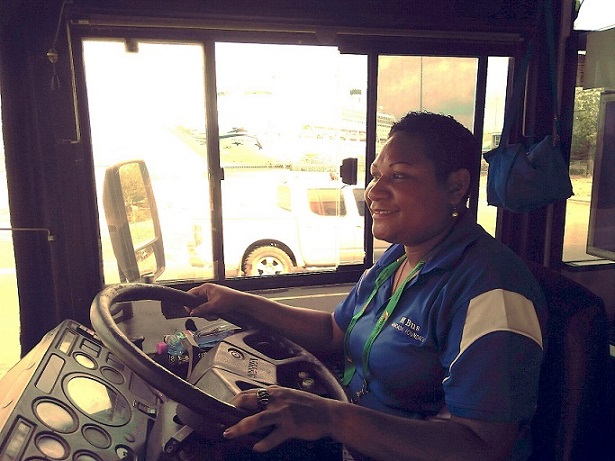Each day, Gorame Momo navigates a large, 29-seater bus through the busy streets of Port Moresby to enable women and young girls safely travel around the city.
She is a Meri Bus driver, providing safe transport through a women-only public transport service. A mother and grandmother from Kira Kira Village in the National Capital District, Gorame had not worked formally before she applied to the Meri Bus women-only driver training program in 2017.
Becoming a Meri Bus driver has changed Gorame’s life. The knowledge and confidence gained through her new profession and her dedication to supporting women, has been formally recognised in her community as a respected leader, championing women’s right to safely travel around Port Moresby.
She was recently elected as president of her village’s Women’s Association, consisting of more than 300 women. “My community has so much respect for me and the work that I do,” Gorame shared. “When I’m in a public space, I have people come up to me and say things like, we know you, you are a Meri Bus driver”.
Before Meri Safe Buses, women often felt unsafe travelling on public transport. In 2014, a UN Women study funded by Pacific Women, found that 98% of the women and men surveyed used public transport to go to the market or go to school. 97% of women and girls reported feeling unsafe at bus stops, experiencing instances of sexual harassment and other forms of violence.
In response, local organisation Ginigoada Foundation PNG Inc. obtained Public Motor Vehicle (PMV) licenses for six Meri Buses in Port Moresby and then Lae. These buses provide safe and regular transport services for women and school aged children with routes designed for access to healthcare services, markets, work and schools. Ginigoada receives ongoing technical support from UN Women and is supported by the Papua New Guinea-Australia Partnership through Pacific Women Shaping Pacific Development (Pacific Women) in PNG.
Over the past two and half years driving Meri buses, Gorame and her colleagues have experienced first-hand how their reliable women-only service has changed the lives of women from all walks of life.
“We have regular women, women community leaders, young girls, working mothers, market mothers, women who risk their lives sweeping the streets of Port Moresby daily and the list goes on,” said Gorame. “They are always very thankful for the services we are providing.”
In Port Moresby alone, over 135,000 trips have been taken by women and children since the service was established. In May 2019, Pacific Women supported Ginigoada Foundation PNG Inc. to expand the Meri Buses into the city of Lae in the Morobe Province.
The Meri Bus routes are designed to help women easily and safely access healthcare, schools and markets throughout the city. “My route runs directly to the general hospital, the labour ward and the women’s ‘well-baby’ health clinic,” explained Gorame. This is helping women access sexual and reproductive healthcare services.
Last year the Meri Bus project introduced additional morning and evening services to three Port Moresby schools, ensuring young girls could safely access schooling.
Meri Bus drivers often go out of their way to ensure women reach their destination safely. “Sometimes we pick women up with their heavy load of market goods and drop them right at the entrance of Boroko Market and they really appreciate the service,” shared Gorame. “Our security personnel are just as helpful and carry the women vendor’s bag into the market.”
The Meri Bus Service have partnered with Sanap Wantaim (Stand Together), UN Women’s city-wide youth-led behaviour change campaign supported by Pacific Women in Port Moresby and Lae.
The Sanap Wantaim Campaign sensitises the public on gender equality and how to identify and respond to sexual harassment in public spaces. The youth leaders also run information sessions on Meri Seif buses, helping women access resources for family and sexual violence support services during the safety and convenience of their bus trip.
Gorame sees first-hand how the wider community has come to view the Meri Seif Buses as places of refuge and support for women experiencing violence. “The Sanap Wantaim campaigns…are very good and they help our women to find help,” she said. “There are times women get in the bus just to get away from their partners who are trying to attack them and some instances where mothers come to us at the bus stops to collect brochures to call the helpline.”
But driving a Meri Bus also has its challenges. Gormae and her colleagues are often confronted in the male-dominated public transportation industry. “Every day is a challenge!”
“When we first started, PMV bus drivers thought that we were taking their business away. They would verbally abuse us and throw objects at us. They block our way when trying to get into a bus stop and had issues with taxi drivers who would park at the bus stops. They would even put sharp metal objects on the road to puncture the Meri Buses’ tyres.”
But these challenging conditions have not deterred the Meri Bus drivers. “We still manage under the circumstances because I believe in the kind of service that I am providing,” Gormae explained.
Pacific Women in Papua New Guinea is supported by the Australian Government in partnership with the Government of Papua New Guinea and the Government of the Autonomous Region of Bougainville.
For further information, including access to related materials, please contact the Australian High Commission media team: +675 7090 0100

Gorame Momo driving a Meri Bus on the busy streets of Port Moresby. PC: Ginigoada Foundation PNG Inc.
